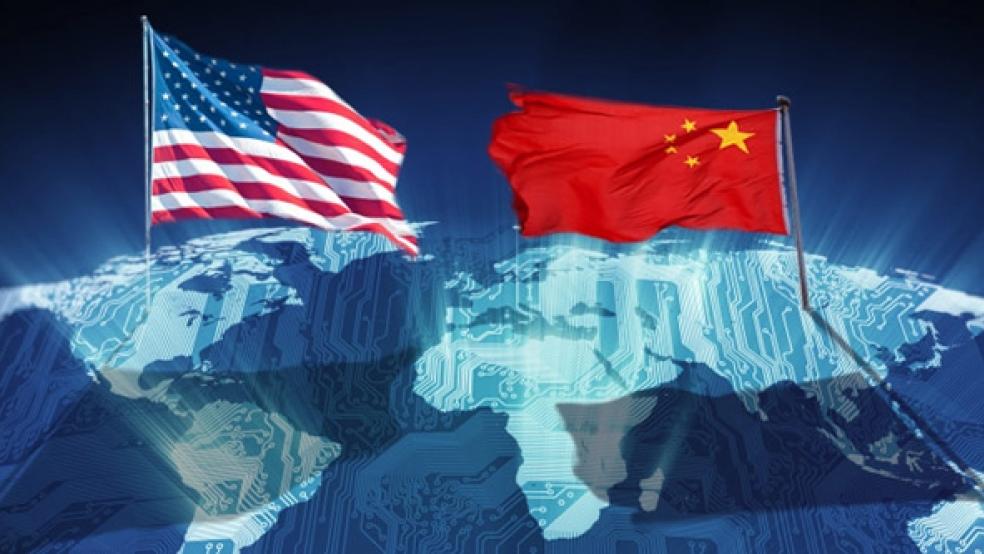An embattled White House and an upcoming summit between President Obama and newly installed Chinese President Xi Jinxing raises red flags.

Beijing has an agenda and President Obama needs a political win. China will push for greater access to U.S. technology, energy and agriculture through loosened restrictions on direct investment and a bilateral trade agreement. President Obama will be tempted to make a deal – a deal that could weaken American long-term interests in exchange for a politically popular pact on cyber security or climate change.
This cannot be allowed, especially in light of news Monday that “designs for many of the nation’s most sensitive advanced weapons systems have been compromised by Chinese hackers,” according to a report in the Washington Post.
Is it disloyal to be wary of Mr. Obama’s objectives? Hardly. This is the president who reassured Russian President Medvedev that he would have “greater flexibility” on missile defense after the election – surely one of the most chilling asides in U.S. history. If he is willing to deceive on matters of national security, how can we trust him on more mundane topics such as cyber security?
Surprising as it may be to many Americans, China is struggling. For decades the country’s growth stemmed from low-cost labor, fortuitously combined with an explosion in trade thanks to the internet revolution and rising consumer appetites in the U.S. and Europe. That model is now defunct, as countries like Bangladesh, Cambodia and Vietnam have stolen China’s playbook, stepping up to provide the cheap labor sought by multinational manufacturers. Beijing has responded with a plan – the 12th Five-Year Plan- that seeks to ‘rebalance” the economy through greater domestic consumption. With China’s savings rate at nearly 50 percent, the plan is to drive that lower while pushing incomes higher.
Shifting gears in such a profound manner is not easy. China’s growth has slowed recently, in part because of the worldwide financial crisis and in part because the country has lost share of the global export market. Last week came the shocking news that China’s manufacturing sector may have shrunk in the past month.
This is more than challenging to China’s policy makers – it is threatening. The country continues to experience urbanization, and needs to provide jobs to the millions that migrate to the cities from rural areas each year. The profound income inequality in China combined with increased outrage over corruption and pollution has prompted more frequent demonstrations against the government – to such an extent that the leadership recently clamped down on visible displays of wealth.

Despite China’s rapid growth over the past few decades, U.S. per capital income is more than 8 times that of the world’s second-largest economy. China’s minimum wage is less than one third that of the U.S. China continues to lag in innovation and technology, and lacks adequate domestic energy and arable land. Its food industry is unsafe and inefficient, healthcare and education is uneven and in its rapid industrialization the country’s air and water have been trashed.
These facts of Chinese life were noted in a new study presented recently at the Asia Society in New York and produced by the China-United States Exchange Foundation, which represents think tanks and business interests in the two countries. The study assesses the relationship between China and the U.S., noting the many advantages of economic cooperation.
The paper references a McKinsey projection that China’s middle class will grow to 630 million in 2022 from 230 million last year – a hugely attractive developing market for U.S. consumer goods suppliers. On the other hand, the U.S. is described as “the principal source of innovation in the world” with “the best universities in the world” and has in prospect low energy costs thanks to the “abundant reserves of shale oil and gas.” The study describes American energy prospects as a “game changer”, allowing for shrinkage of our trade deficit and “providing the foundations for a manufacturing revival.”
The authors of the study make recommendations to the leaders of both governments – calling for bilateral free trade and investment agreements and more collaboration in science and technology –particularly in energy and so-called and “green” industries. The report calls upon both countries to “streamline” their visa process, ultimately looking to a “visa-free regime,” and to hammer out an understanding on cyber security and intellectual property theft. The authors would also like the U.S. to relax its export controls on “high-tech products” and to loosen its scrutiny of Chinese investments in the U.S.
Though the U.S. certainly stands to benefit from expanded export opportunities to China, it is not clear that allowing greater access to our technology is in our long-term interests. Today, that is our competitive advantage. China’s massive cyber invasions of our companies and institutions, which increasingly appear government-condoned if not orchestrated, signals Beijing’s desperate search for growth engines. If the U.S. is wary of sharing our nation’s secrets, we have history on our side. Ask any CEO who has operated in China, and you will hear that the process is geared towards stealing our technology and systems. On a national level, the aim is the same.
Mr. Xi will want to head home from the sequestered West Coast meeting with some wins, as will President Obama. China will look to penetrate U.S. technology, Obama might ask the Chinese to promise participation in the next round of climate talks, or get Xi’s help in dealing with North Korea. What Mr. Obama may not recognize is that China’s problems and needs today may actually trump our own. Unfortunately, that vision is less likely to inform the negotiations than are the scandals swirling about the White House, and his need for a political boost. Somehow, it seems unlikely the U.S. will emerge the winner. Let us hope otherwise.



